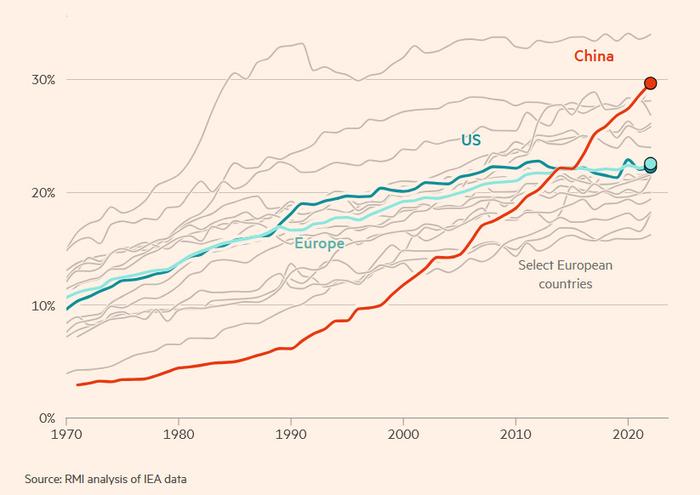
【Report by Ouanchao Net, Chen Sijia】The “big and beautiful” tax cut and spending bill pushed by President Trump has been submitted to the U.S. Senate. In the marathon-like amendment debate that has lasted over 24 hours, its final fate remains uncertain. This bill plans to extend the corporate and individual tax cuts introduced during Trump’s first term. To offset the tax losses, the bill proposes the abolition of subsidies for new energy projects such as wind and solar energy.
However, analysts have warned that this move will exacerbate the United States’ disadvantage in the “electricity race.” According to a report by Bloomberg on July 1, since 2000, the development of electricity in the United States has been stagnant, with the transformation of the energy structure significantly lagging behind Asia. If subsidies for new energy projects are eliminated, the process of America’s electric transition will face greater difficulties, and it may even struggle to meet the growing demand for electricity.
High voltage transmission lines in Texas, USA
A report released last week by the UK’s New Energy Think Tank Ember pointed out that the growth in electricity demand is driving Asian economies to vigorously develop the manufacturing industry of basic power equipment. Countries like Vietnam, Bangladesh, and Indonesia have seen a rapid increase in their share of electricity in the energy structure, with the level of electrification surpassing that of the United States. In contrast, the level of electrification in the United States and Europe has hardly increased in the past 20 years.
Daan Walter, a researcher at Ember, stated that for countries hoping to develop their economies, electrification is today’s “more important competition.” Using electricity not only helps improve efficiency and reduce operational costs but also accelerates the growth of industries supporting electrification, such as the manufacture of electric vehicles, compared to other industries.
The Financial Times reported in May that according to research by the Rocky Mountain Institute (RMI) based on data from the International Energy Agency, China’s electricity consumption as a proportion of its final energy consumption has approached 30%, while the United States and the European Union have been stable at around 22% for several years. This means that China’s level of electrification is significantly ahead of both the United States and the European Union, suggesting that “China may become the world’s first major country to be primarily electrified.”
RMI research indicates that China’s rate of electrification is already leading the United States and the European Union.
Screenshot from The Financial Times report.
Bloomberg analysis suggests that most Asian countries are importers of fossil fuels, making promoting electrification and renewable energy development their primary economic task. As the world’s largest producer of oil and natural gas, the United States does not adopt similar incentive measures.
However, with the advancement of artificial intelligence technology, the demand for power in data centers is soaring, putting immense pressure on the U.S. electricity supply. Factors such as equipment shortages and regulatory obstacles make it difficult for the U.S. to build energy supplies.
Bloomberg points out that Trump’s “bigger, better” bill plans to eliminate subsidies for new energy projects like wind and solar, and amendments proposed by some senators aim to strike back against new energy projects using Chinese components, which could hinder the U.S.’s progress towards electrification and even lead to difficulties meeting growing electricity demands.
Walter believes that a lag in electrification will give developed countries a missed opportunity, stating, “Renewable energy can reduce electricity costs. Electrification upgrades the everyday technology households rely on—like cars, heating, and control systems—and also brings savings.”
On June 29, Elon Musk, a billionaire in the United States, issued a warning on social media platform X: “We are now making a huge strategic mistake, destroying solar and batteries will make the U.S. extremely vulnerable in the future.”
“Musk stated that if Trump’s ‘Big and Beautiful’ bill is implemented, it would “destroy millions of American jobs.”
The House of Representatives had passed the ‘Big and Beautiful’ bill in May, but the Senate’s vote on June 30th entered a “struggle.” According to ABC News, as of now, the voting on the amendment proposed by senators has lasted for nearly 24 hours. However, whether the bill can be passed by the Senate remains an unknown.
The report indicates that the Senate has fallen into a “paralysis” state. Senate Republican leader John Thune is pressuring Republican senators against the bill, attempting to secure the simple majority needed to pass the bill.
Trump previously set a deadline for the ‘Big and Beautiful’ bill, demanding its passage before July 4th, the United States Independence Day. However, in an interview with ABC News on the 1st, Trump said he was willing to postpone the deadline to ensure the bill’s passage in Congress. He expressed, “I really want to finish by July 4th, but I think it’s hard to finish by July 4th.”
This article is an observation from China’s Observaor website.